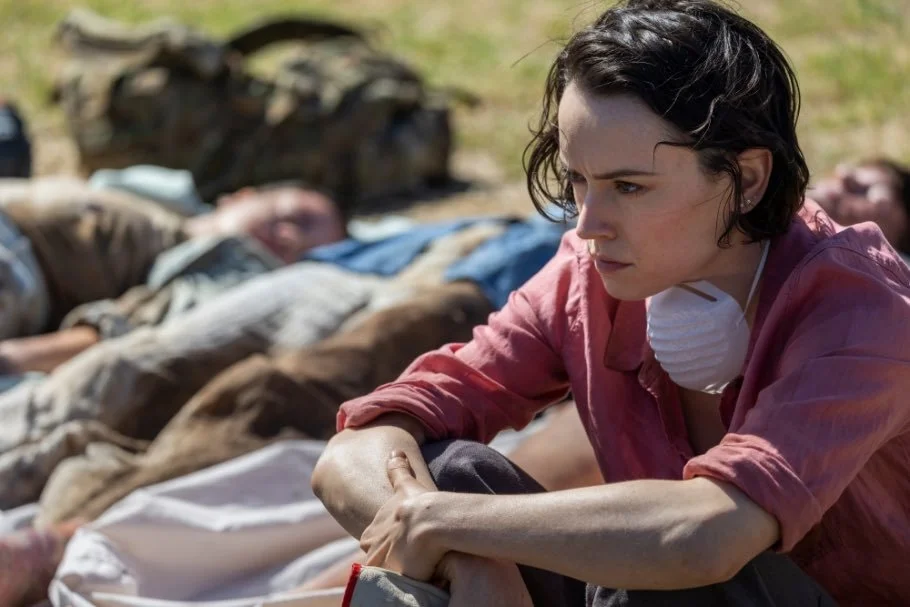MIFF 2025 | ‘We Bury The Dead’ review: A capable but unremarkable entry into a long-overstuffed genre
Australian director Zak Hilditch gamely makes a play for zombie horror canonisation, but sadly falls just short of the mark.
Daisy Ridley in “We Bury The Dead.” Photo courtesy of the Melbourne International Film Festival.
Zombie horror has long been a breed of movie where quality is hard to find amidst overwhelming quantity. Bogged down by slow, tired tropes deployed again and again in terminally undercooked schlock, the subgenre is redeemed every few years or so by gems that breathe new life into simple concepts ripe with possibility. From George A. Romero to John Carpenter, Sam Raimi, and most recently, Danny Boyle and Alex Garland, the future of zombie horror has always lain with its most talented writers and directors — the question is whether any new hopefuls eager to be canonised will truly make the cut.
“We Bury The Dead” is Australian director Zak Hilditch’s attempt to join that most hallowed pantheon of zombie horror pioneers. Both written and directed by Hilditch, the film follows Ava (Daisy Ridley), a grieving American who journeys halfway across the globe to search for her husband Mitch (Matt Whelan) after a botched US military experiment wipes out the entire population of Tasmania. With the help of her body retrieval unit partner, compulsively likeable sleazebag Clay (Brenton Thwaites), Ava manages to slip past the bureaucratic barriers preventing her from reaching Mitch’s last-known location. But the slowly reanimating corpses strewn across Tasmania’s devastated cities, as well as an encounter with highly-suspect soldier Riley (Mark Coles Smith), will prove far greater threats than Ava or Clay could ever have anticipated.
There’s not much ground in “We Bury The Dead” that isn’t directly comparable to, and ultimately still inferior to, the touchstone of 21st century zombie flicks, “28 Days Later.” “We Bury The Dead” starts off on strong footing, presenting a much more novel twist on the genre only to discard it prematurely in favour of all the same old, tired tropes. The first reanimated corpse that Ava and Clay encounter is completely docile, standing in its garage with an almost melancholic expression on its desiccated face — the film’s most chilling moment, and unfortunately, the likes of which we never quite see again outside this one instance. The ethical and emotional ramifications of killing pliant entities that were once human are far more interesting and thorny quandaries than the time-worn routine of axing aggressive “zombies” final-girl style. Yet this is all the film is reduced to by the time it exits its slightly more compelling but still unoriginal second act, which is almost entirely devoted to that old chuckle and eye roll — the worst danger in the zombie apocalypse is still living, breathing men; am I right, ladies? — that harkens directly back to Boyle and Garland’s genre-redefining work without any additional innovation or verve.
This isn’t helped by Daisy Ridley’s struggles in the lead role as Ava, seemingly still devoid of much charisma long after the JJ Abrams-helmed “Star Wars” disasters. Her performance never quite elevates itself above a one-note portrayal of anger and grief — although this may, admittedly, be inextricable from Ava’s overall poor characterisation; nothing beyond a sketch of anger and grief. Similarly, Mark Coles Smith and Brenton Thwaites are stuck doing too much with way too little, the latter without much else to do apart from deploying his much-welcome charm as an antidote to Ridley’s often too-staid screen presence; the former imbues the all-too forlorn Riley with a desperate menace that is palpable through the screen but still not much in the way of unsticking the film from the bog of clichés it has mired itself in.
Not all is lost — if action and thrills are the main things you’re after, there is still plenty to love here. After all, as the old saying goes, shoot for the moon, and even if you fail, you’ll land among the stars. Despite its multiple wasted opportunities to venture into uncharted territory, “We Bury The Dead” is nonetheless a tightly-paced, self-assured zombie flick that utilises some great sound design and a soaring soundtrack to pick up moments in which its muddled thematic gestures start to flag. It’s just a shame that it ultimately fails to distinguish itself from the rest of its ilk to grant Zak Hilditch the zombie horror canonisation that he so clearly covets — perhaps an improved sophomore effort in the genre will get him there at last.
